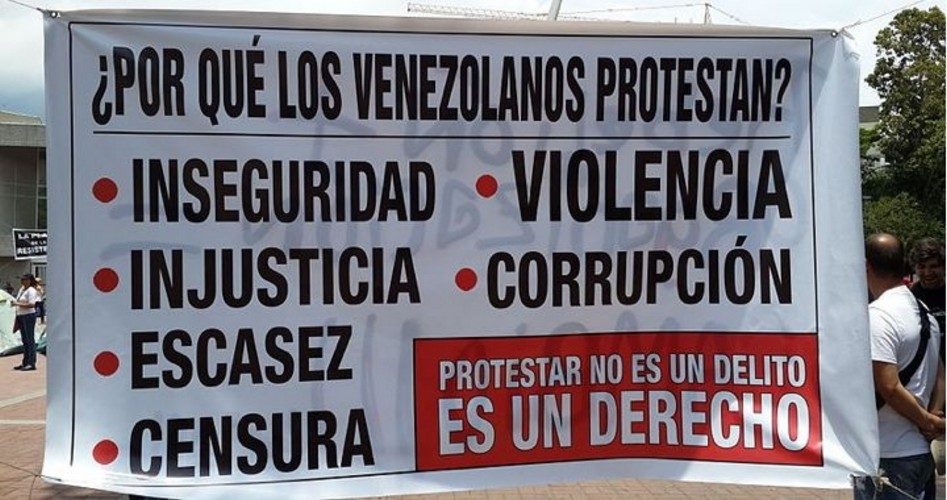
The economic chaos in Venezuela turned political on Sunday. When Brazil’s President Nicolas Maduro’s National Electoral Council (CNE), packed with his cronies, declared attempts to call for a national recall referendum on Maduro’s presidency null and void on Friday, opposition leaders called it a “coup.” A resolution was passed by the National Assembly (under control of Maduro’s opposition since January), declaring that the Congress would try Maduro starting on Tuesday, while also calling for national public protest demonstrations on Wednesday.
Julio Borges, the opposition leader, said, “It is a political and legal trial against President Nicolas Maduro to see what responsibility he has in the constitutional rupture that has broken democracy, human rights, and the future of the country.”
The accelerating collapse of Venezuela has been covered by The New American here, here, and here, which has tracked the economic destruction back to policies first initiated 17 years ago by Venezuela’s Marxist President Hugo Chavez, policies then followed with a vengeance following his death in 2013 by his protégé Maduro.
To ensure that the natives don’t get too restless and throw him and his cronies out of office (likely with extreme prejudice), Maduro named his supporters to the country’s Supreme Court and to the pivotal election commission, CNE — the National Electoral Council originally installed to protect the voting process and keep it honest. He also ordered the state-controlled media to ignore anything going on in Congress, in effect silencing them. Any laws that Congress manages to pass inimical to Maduro are declared unconstitutional by his packed court.
The resolution passed on Sunday is Congress’ attempt to begin to right the sinking ship, beginning with trying Maduro and then replacing his cronies on the court and the electoral commission. Although Maduro suffers from an approval rating of just 20 percent, and although the opposition was voted into office overwhelmingly in January, the chances that anything substantial will be accomplished are modest, according to the BBC: “The resolutions passed on Sunday are largely symbolic and unlikely to have much effect as the government and the Supreme Court have so far scuppered any attempts by the opposition to push through bills which President Maduro opposes.”
Notwithstanding reporting by the compliant press, the situation is probably relatively fluid, considering the players in the game. It begins with Julio Borges, the leader of the opposition that controls the National Assembly. He has degrees in law and public policy from establishment schools Boston College and the University of Oxford. Since Borges is in a position to direct the future path of Venezuela once Maduro is gone, he could become a linchpin in efforts by the U.S. Department of State (DOS) and/or the CIA to intervene once the situation becomes desperate enough. If he becomes an instrument of foreign entities, he may be able to replace Maduro’s cronies on the Supreme Court and the CNE with his own.
The DOS noted a year ago, as faithfully reported by the establishment journal Foreign Policy, that “there is widespread pre- and post-election fraud [in Venezuela], including electoral irregularities, government interference, and manipulation of voters,” adding that “opposition political parties [have] operated in a restrictive atmosphere characterized by intimidation, the threat of prosecution or administrative sanction on questionable charges, and restricted media access.”
This foreign concern was amplified by a report issued by the International Crisis Group (ICG) last August, setting the stage for further foreign intervention:
A sharp fall in real incomes, major shortages of essential foods, medicines and other basic goods and breakdown of the health service are elements of a looming social crisis.
If not tackled decisively and soon, it will become a humanitarian disaster with a seismic impact on domestic politics and society, and on Venezuela’s neighbors.
Not surprisingly the ICG was formed following a “chance” meeting between two officials of the Carnegie Endowment for International Peace and the World Bank in 1993. It was funded shortly thereafter by George Soros.
All of which not only establishes the plausible case for outside intervention for “humanitarian” reasons, but sets the stage for that intervention, which now appears imminent. Concluded Foreign Policy: “Venezuela’s toxic brew of repression, economic chaos, criminality and corruption pose direct threats to regional peace and security.”
Maduro is no fool. Economically his policies are wreaking havoc on his people, and politically he knows that he is expendable, so he is trying solidify his socialist base. Following Sunday’s session, Maduro sent a video message to his state media that was remarkably transparent:
The [socialist] revolution will continue to win despite the constant pretensions of the right [Julio Borges?] which is trying to take over power by unconstitutional means.
Those “pretensions of the right” have called for massive public “peaceful” demonstrations against Maduro’s administration on Wednesday. Historians have repeatedly noted that such demonstrations often turn violent, creating just the atmosphere for interventions (domestic and foreign) that wind up replacing one Marxist thug with another.
This is speculation, of course. Positive change is always welcome and encouraged. The Venezuelan people have suffered under 17 years of socialist rule, and it is hoped that that suffering will soon come to an end. At the moment, however, it appears to be just that: hope.
An Ivy League graduate and former investment advisor, Bob is a regular contributor to The New American magazine and blogs frequently at LightFromTheRight.com, primarily on economics and politics. He can be reached at [email protected].
Related articles:
Venezuela’s Collapse: Horror Beyond Belief
Venezuela’s President Deliberately Stalling Recall Referendum



